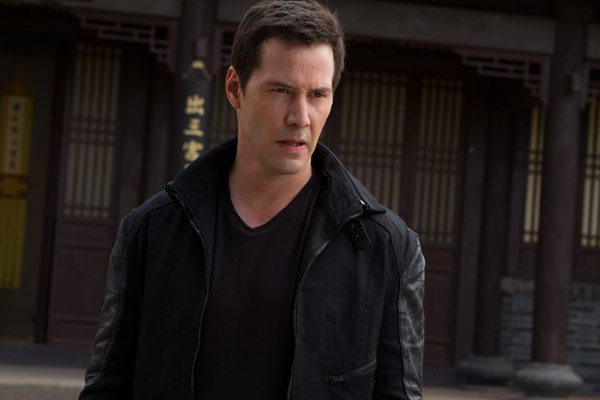The first thought that comes to mind when looking at the trailer for Man of Tai Chi is “Aw, ain’t it cute, Ted Logan (Bill & Ted’s Excellent Adventure) made a movie, and he’s showing off the Neo-kung fu thing.” But once that snarky bit goes away, it’s not too hard to see why director Reeves would make this movie. For one thing, there has been a recent influx of tai chi movies—in the past year I’ve reviewed two with “Zero” and “Hero” in the titles. Now we’re in modern times as opposed to the martial arts days of old, and the fight choreography is slick as can be. As for the plot….
Tiger Chen plays Tiger, who learns the Ling Kong style of tai chi very quickly from his Buddha-like Master (Yu Hai), and works slavishly as a delivery boy. But while performing a fight on a TV competition show, he catches the attention of a very serious player, Donaka Mark (Reeves), who summons him. Though on the surface Mark runs a “security” company, he organizes one thing: fights. Fights for money, which Tiger at first refuses (he can’t use his tai chi for money, you see).
But times change quickly, and when the Master’s compound is under threat of being destroyed for being too old or rundown or not teaching the latest kung fu (“get with the times, old man,” is probably uttered under a side character’s breath somewhere), Tiger has to accept Mark’s offer since no one else is around to help out.
Naturally, there’s more than meets the eye to what Mark is doing, as seen in an almost rushed opening. It is clever how quickly Reeves establishes his character as a villain, a cold-blooded killer without a trace of humor, who will not only kill those who won’t fight but those who are left alive. The one really fun twist (and this isn’t a spoiler; you can glean this from the first 10 minutes) is that Tiger’s whole life is being monitored as a kind of Truman Show-style event for pay-per-viewers.
Who exactly are these people watching and paying so much? As Mr. Mark says a few times in the film, “Does it matter?” Really, the story here is one that is just littered with clichés, conventions, what have you: the “Save the Dojo” sounds almost like the “Save the Rec Center” plot you might find in a dance movie from the ’80’s or ’90’s, and then there’s the Master character, the not-quite love interest, and the Hong Kong police captain (Karen Mok), who will stop at nothing to bust Mark’s whole operation open.
And there’s Tiger himself, who must find himself through these fights, go through the motions of power-anger-rage-defeat-acceptance-transcendence (I guess), and become “the one” that Mark calls Tiger (as if to echo, not subtly I think, Reeves as “The One” in The Matrix). Meanwhile, Reeves is stone-faced 70-75 percent of the time, and for the rest he is just having a blast, bursting out with aggressive “AAAH!” screams, crazy facial expressions, going full-Nicolas-Cage here and there. Ultimately, he’s both a detriment (sometimes he sounds intentionally, or unintentionally, stilted and stiff as a board, which wouldn’t be the first time) and a boon to the proceedings. He is a captivating presence compared to Tiger Chen, cast as an Asian, younger version of Reeves (the resemblance is striking).
So why watch the movie, which is a boilerplate kung fu (insert adjective here) story with predictable twists and turns? Simple: the fights are excellent. They’re the finest that you can see outside of The Raid: Redemption. This, I think, is less a credit to Reeves than to fight director Yuen Woo Ping, and it’s nice to see them filmed so you can see what is happening even with the breakneck timing of edits and angles.
Yuen Woo Ping, to refresh your memory, is one of the legendary action directors in the world of cinema—including, appropriately enough, Tai-Chi Master from the ’90’s, many of Jet Li’s films, the Kill Bill films, and this year’s The Grandmaster, which had some tai chi in it as well. He makes all the fights seem logical, even when it comes time for the one fantastical bit of action (involving, in Mortal Kombat video-game terminology, the “HADOUKEN!”). It still feels right. If you can get through some wooden acting, hapless bits of story, and even a car crash that, surprising considering the rest of the film, is ridiculously fake looking, the fights make it worth to rent, if not to rush out and see. If you are a kung fu fanatic though, be my guest.

















Leave A Comment